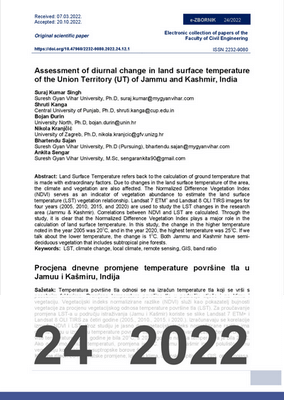ISSN 2232-9080
ASSESSMENT OF DIURNAL CHANGE IN LAND SURFACE TEMPERATURE OF THE UNION TERRITORY (UT) OF JAMMU AND KASHMIR, INDIA
- Issue: No. 24, December 2022, Vol. 12
- Author(s): Suraj Kumar Singh, Shruti Kanga, Bojan Đurin, Nikola Kranjčić, Bhartendu Sajan, Ankita Sengar
- Type: Original scientific paper
- DOI: https://doi.org/10.47960/2232-9080.2022.24.12.1
Abstract: Land Surface Temperature refers back to the calculation of ground temperature that is made with extraordinary factors. Due to changes in the land surface temperature of the area, the climate and vegetation are also affected. The Normalized Difference Vegetation Index (NDVI) serves as an indicator of vegetation abundance to estimate the land surface temperature (LST) vegetation relationship. Landsat 7 ETM+ and Landsat 8 OLI TIRS images for four years (2005, 2010, 2015, and 2020) are used to study the LST changes in the research area (Jammu & Kashmir). Correlations between NDVI and LST are calculated. Through the study, it is clear that the Normalized Difference Vegetation Index plays a major role in the calculation of land surface temperature. In this study, the change in the higher temperature noted in the year 2005 was 200C, and in the year 2020, the highest temperature was 250C. If we talk about the lower temperature, the change is 10C. Both Jammu and Kashmir have semi-deciduous vegetation that includes subtropical pine forests.
Keywords: LST, climate change, local climate, remote sensing, GIS, band ratio







